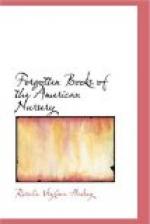There is another point of interest in connection with this English author’s tale. Whether consciously or not, it is a very good imitation of Peter Parley’s method of travelling with his characters in various lands or over new country. It is, perhaps, the first instance in the history of children’s literature of an American story-writer influencing the English writer of juvenile fiction. And it was not the only time. So popular and profitable did Goodrich’s style of story become that somewhat later the frequent attempts to exploit anonymously and profitably his pseudonymn in England as well as in America were loudly lamented by the originator of the “Tales of Peter Parley.” It is, moreover, suggestive of the gradual change in the relations between the two countries that anything written in America was thought worth imitating. America, indeed, was beginning to supply incidents around which to weave stories for British children and tales altogether made at home for her own little readers.
In the same volume Mrs. S.C. Hall also boldly attempted to place her heroine in American surroundings. Philadelphia was the scene chosen for her tale; but, having flattered her readers by this concession to their sympathies and interest, the author was still sufficiently insular to doubt the existence of a competent local physician in this the earliest medical centre in the United States. An English family had come to make their home in the city, where the mother’s illness necessitated the attendance of a French doctor to make a correct diagnosis of her case. An operation was advised, which the mother, Mrs. Allen, hesitated to undergo in an unknown land. Emily, the fourteen-year-old daughter, urged her not to delay, as she felt quite competent to be in attendance, having had “five teeth drawn without screaming; nursed a brother through the whooping-cough and a sister through the measles.”
“Ma foi, Mademoiselle,” said the French doctor, “you are very heroic; why, let me see, you talk of being present at an operation, which I would not hardly suffer my junior pupils to attend.”
“Put,” said the heroic damsel, “my resolution, sir, to any test you please; draw one, two, three teeth, I will not flinch.” And this courage the writer thought could not be surpassed in a London child. It is needless to say that Emily’s fortitude was sufficient to endure the sight of her mother’s suffering, and to nurse her to complete recovery. Evidently residence in America had not yet sapped the young girl’s moral strength, or reduced her to the frivolous creature an American woman was reputed in England to be.




